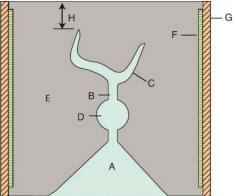CASTING INVESTMENTS AND CASTING PROCEDURES
1/43
There's no tags or description
Looks like no tags are added yet.
Name | Mastery | Learn | Test | Matching | Spaced | Call with Kai |
|---|
No analytics yet
Send a link to your students to track their progress
44 Terms
CASTING
production of a shape by thrusting a molten liquid or plastic material into a mold
INVESTING
process of producing the mold
covering or surrounding something
LOST WAX CASTING TECHNIQUE
Involves creating a mold by coating an expendable wax pattern with a heat-resistant slurry that hardens at room temperature
abutment
what is the tooth that holds the restoration called?
TYPE IV (DIE STONE)
TYPE V (IMPROVED GYPSUM DENTAL STONES)
what types of die stone are commonly used for making dies?
The die
where is the wax pattern made from>?
A. CRUCIBLE FORMER SPACE
B. SPRUE
C. “CROWN” SPACE
D. RESERVOIR
E. INVESTMENT MATERIAL
F. CASTING RING LINER
G. CASTING RING
label

WAX PATTERN FABRICATION
wax form that is the positive likeness of the final restoration
form a mount for the wax pattern and fix the pattern in pace so the mold can be made
hold the wax pattern in position
be an avenue where molten metal can go to the mold of the restoration
channel for elimination of wax during burnout procedure
what is the purpose of a sprue?
Shrinks
What happens to molten metal when it sets?
Sprue and reservoir
What are the things that contribute to the compensation for the setting shrinkage of the molten alloy?
same size as the thickest bulk of the pattern
what should the diameter of the sprue be?
“suck-back” porosity
distortion due to pressure
porosity bc of difficulty of metal going through
large sprue + thick wax pattern =
thick sprue + thin wax pattern =
thin sprue + thick wax pattern =
point of greatest bulk in the pattern.
where should the sprue former be placed?
sprue will deform
what happens if you place the sprue on a thin portion of the wax pattern?
it will have a thick clearance
it will have a big space on the top which makes it hard for gasses to escape
\the metal would not flow
What happens if the sprue length is too long?
there is inadequate clearance
there is a short space from the top which makes it easy for gasses to escape
there is a possibility for the material to fracture/break
what happens if the sprue length is too short?
GYPSUM BONDED INVESTMENT - 6mm
PHOSPHATE BONDED INVESTMENT - 3-4mm
what is the clearance needed for the typed of investment materials?
CASTIING RING LINER
lines the interal diameter of the ring
CASTING RING
metal tube in whcih a refractory mold is made for casting dental restorations
CONTAINER for investment material while it sets
COMPLETE RING
SPLIT RING - kayang bumuka without a liner to allow for expansion
What are the kinds of casting rings?
CASTING RING LINER
allows for greater setting expansion in the investment material
has the ability to absorb water especially if cellulose or paper is used
happens when gypsum produce is allowed to set while in contact with water
what is hygroscopic setting expansion?
there will be thin and thick areas that will lead to deformities
what happens if the liner overlaps in the ring?
3mm from the top and bottom of the ring and should be at least 1mm thick for it to allow expansion
what is the clearance for the casting ring liner?
ASBESTOS
traditionally used; carcinogenic
ALUMINOSIICATE CERAMICS
CELLULOSE
light paper; usually used now
what are options for materials to use as a liner?
DRY
uses sticky wax
may involve semi- hygroscopic setting expansion if placed in water after pouring
WET
helps cause semi-hygroscopic setting expansion
uniformly wet
avoid squeezing
what are the casting ring liner technques?
REFRACTORY AND THERMALLY STABLE
NO CHEMICAL INTERACTION WITH METAL SURFACE
EASY TO REMOVE FROM METAL CASTING
requirements for investment material?
for casting GOLD alloys
it cannot be used for other alloys
what are gypsum bonded investments used for?
BINDER
a-hemihydrate of gypsum
FILLERS: silica polymorphs
quartz
tridymite
cristobalite
fused quartz
MODIFYIG AGENTS
COLORING MATTER
REDUCING AGENTS
what is the composition of gypsum bonded investments?
for alloys with a higher melting temperature
what are phosphate bonded investments used for
PHOSPHATE BONDED INVESTMENTS
which investment material should you use if your alloy has a higher melting temperature?
SILICA FILLER: 80% BY WEIGHT
BINDER
magnesium oxide (basic)
monoammonium phosphate (acidic)
composition of phosphate bonded investments?
FILLERS
silica and magnesium oxide
BINDER
silica gel that reverts to silica (cristobalite) on heating
composition of ethyl silicate bonded investments
HAND INVESTING
VACUUM INVESTING
PAINT-OFF TECHNIQUE
Methods of investing?
HAND INVESTING
manual mixing and pouring of investment
VACUUM INVESTING
mixing of material is completed in a vacuum
porosity is reduced
smoother texture and with better detail
tensile strength increased
eliminates porosities and bubbles
PAINT-OFF TECHNIQUE
done after mixing
wax pattern is painted with wet investment material
GYPSUM BONDED INVESTMENT
Hygroscopic expansion technique: 500C
thermal expansion technique: 700C
PHOSPHATE BONDED INVESTMENT
700-1300C
ETHYL SILICATE BONDED INVESTMENT
1090C
burnout temperature for different types of investments
SIZE OF RING
BURNOUT TEMP
NUMBER OF RIGS
TEMP OF OVEN AT THE START OF BURNOUT
factors affecting burnout time
WAX EXPANSION
SETTING EXPANSION
HYGROSCOPIC EXPANSION
THERMAL EXPANSION
compensation for shrinkage of metal after cooling
CASTING
Process of filling the space with molten metal
HEAT SOURCE AND CASTING FORCE
basic requirements of casting
DISTORTION
SURFACE ROUGHNESS, IRREGULARITIES
POROSITY
INCOMPLETE CASTING
defects in casting